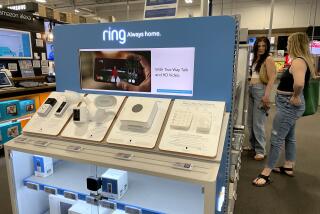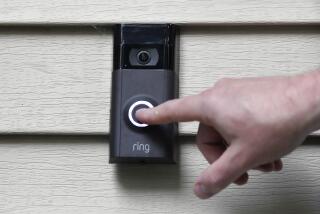Deluge of Electronic Goodies Overloads Customers’ Circuits
- Share via
This is the year of the wired home.
That mantra has been chanted with a glazed-eyed and near-religious fervor for the last year by everyone from PC giants to consumer electronic makers.
So why do all these major players in the digital world--including Microsoft Corp., Intel Corp. and Sony Corp.--look so desperate and confused?
A seemingly endless stream of electronic goodies have begun pouring onto the market, from digital cameras and MP3 music players to Internet tablets for the kitchen and wireless e-mail services for the car.
The Consumer Electronics Assn. estimates that more devices will be launched from 1998 to 2003 than during the entire previous history of the industry.
Yet the explosion of devices also signals serious trouble brewing beneath this digital bounty. Industry leaders have not agreed on technological standards for a range of products, from digital music devices to home networks, leading to a series of mini-wars that recall the days of the VHS-Beta debates. Store shelves are packed with products that promise to do so much--surf the Web, run video games, play DVD movies--but often leave consumers confused and frustrated.
The strategy for most companies in this increasingly competitive market seems to be to simply throw everything against the wall of consumer interest and see what sticks, analysts say.
As consumer electronics and PC makers prepare to go head to head at the annual Consumer Electronics Show in Las Vegas today, both industries are faced with a relatively grim prospect: How do they convince customers to buy into their glossy digital vision of the future?
In some ways, there are too many possibilities facing the public. And none of the devices so far have grabbed the industry’s golden ring to become the “killer app,” say analysts and industry executives.
“Consumer education is really lagging, so consumers don’t understand the value proposition of all the toys out there,” said P.J. McNealy, an industry analyst with research firm Gartner.
Consider the confusion roiling the home-networking arena--the cornerstone of the much-heralded “smart” home. Scores of technologies and gadgets are on display in Las Vegas to make it all real, but only some of them can work with one another.
At the show, hundreds of companies, from tiny start-ups to behemoths such as Intel and Microsoft, are showing off gizmos that let consumers shop and surf the Net from anywhere: the kitchen counter, the living room TV or even the back seat of a car. Some of these devices talk to one another, but most don’t.
“Whenever the public is exposed to a wide variety of challenging things, they will universally vote by putting hands under buttocks and clinging to their wallets,” said Jeff Thermond, head of the home-networking unit of Broadcom Corp., the nation’s leading communication chip maker, whose products are used in a variety of Internet and digital entertainment appliances for the home.
“When people are confused, you have the worst-case scenario because people stop spending money altogether,” Thermond said.
Retailers are already feeling the pinch. Retail chains such Best Buy Co. and Circuit City Stores Inc. started out 2000 with a sales boom, buoyed by one of the best holiday selling seasons in history.
But as the millennium ended, a slumping stock market and a slowing economy ate away at consumer confidence. With no killer home gizmo this year, the onslaught of new electronic toys elicited only a tepid response from consumers.
The one device that did rise to the killer level, Sony’s PlayStation 2, was plagued by shortages. Citing manufacturing troubles, Sony delivered only half as many of the game devices as it originally promised, leaving customers short-handed and stores filled with grumbling parents.
Despite the slump, there is much optimism for the new home technologies, particularly in the DVD and MP3 digital music arenas.
“It’s just not the sexy, huge growth you’re accustomed to seeing with PC sales,” said Mike Paxton, an industry analyst with research firm Cahners In-Stat. “In the DVD and MP3 player categories, you’re seeing 50% to 80% growth from last year, which is about 10 [million] to 20 million of these units going out the door. That’s still a lot of money.”
That potential has galvanized PC makers, who have seen the line between computers and consumer electronics blur as a result of the digital entertainment boom.
PC makers are trying to place their machines at the center of the home entertainment world because consumers are already using their computers to record CDs, store digital music and watch DVD films.
On the other hand, devices in the living room are becoming more computer-like. Digital video recorders are replacing VCRs, and video game machines such as PlayStation 2 and Microsoft’s upcoming X-Box let people watch movies and surf the Net.
Executives at PC companies acknowledge that the consumer electronics industry, like their own, can be a fickle world, one that rises and falls with economic cycles.
Despite these risks, the PC world is migrating to the consumer electronic arena for one simple reason: survival. After nearly 20 years of development, the typical PC now is far more powerful than what the average consumer or business user needs, analysts say. Companies are taking longer to replace their PCs, and so are families. Computers have already been picked up by 45% of households in North America.
“You just can’t be a pure PC technology company anymore,” said Brian Farrell, president and chief executive at THQ Inc. of Calabasas, a leading video game maker that is developing software for the X-Box. “People don’t just want a PC. They want a device that does something more.”
To win new customers, “Wintel” giants Intel and Microsoft are unveiling products that don’t look like PCs but still use Intel’s chips and Microsoft’s software.
This weekend at CES, Intel will show off a line of branded devices, including an MP3 player, a Web-surfing tablet and an e-mail pager. And Microsoft will unveil its X-Box, one of 2001’s most anticipated entertainment devices and the beginning of what could be the software giant’s most contentious fight.
“For everyone in this space, it all comes down to how easy the [machine] is to use and whether consumers like it,” said Chris Schairbaum, new-business development manager for Texas Instruments’ Internet audio group. “You have to be able to bring something home, plug it in and have it work. Until we have that kind of push-button simplicity, nothing is going to become [the big] consumer crossover.”






